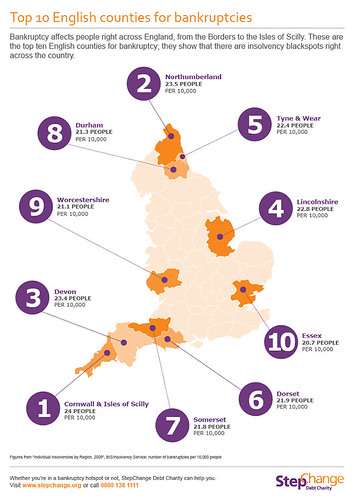You should know that you are not alone if you feel overwhelmed by debt. Debt can quickly accumulate with a speed you aren’t prepared for. The problem now is that it becomes much tougher to fix. The tips in this article will help you know what should be done if you find yourself contemplating bankruptcy.
One of the best ways to learn more about the bankruptcy process is to hit the Internet and look up reputable bankruptcy websites. The United States Department of Justice, the American Bankruptcy Institute and the National Association of Consumer Bankruptcy Attorneys, all provide valuable information. As with everything in life, the more you know about filing a claim, the better off you’ll be. You can properly prepare when you know what you’re preparing for.
One of the most important things to remember when filing for bankruptcy is to be honest and truthful every step of the way. To avoid problems, penalties and future re-filing bans, resist the urge to hide documentation or assets.
Don’t avoid telling your lawyer specific details with your case. Never assume that they can remember all details without reminders. Your case and future are affected by the attorney’s action, so never be afraid to communicate.
Although you can find many bankruptcy attorneys listed in your local Yellow Pages or online, it’s best if you can find one through the personal recommendation of a friend, family member or acquaintance. There are way too many people ready to take advantage of financially-strapped individuals, so you must ascertain that your attorney can be trusted.
Before you decide to file bankruptcy proceedings, determine which assets will be safe. The Bankruptcy Code has lists of various asset types that are exempt during the process. It is vital that you know the things on this list prior to filing for bankruptcy, in order to determine which of your possessions will be taken away. While it might not be possible to protect a particularly beloved possession, at least you will know in advance whether or not you risk losing it.
Seek a less serious option prior to filing for bankruptcy. For example, there are credit counseling services that can help you to deal with smaller amounts of debt. Sometimes you can negotiate a reduced payment, though you must strive to get it all in writing.
There are two types of personal bankruptcy: Chapter 7 and Chapter 13. Make sure you know what each entails so you can make the right choice. Chapter 7 bankruptcy completely wipes out your debt. You will be removed from any contracts you have with your creditors. Chapter 13 is different, though. This type of bankruptcy entails an agreement to pay off your debts for five years prior to wiping the slate clean. You need to be aware of the pros and cons of each type of bankruptcy so you can correctly select the best choice for your situation.
Take advantage of free consultations with lawyers and the ability to sift through and find the right one. Just be sure that the person you speak with really is the lawyer, rather than a paralegal, since they cannot legally give advice. Look for a lawyer who you can relate to.
Understand the differences between Chapter 7 and Chapter 13 bankruptcy. Get a good grasp of the pluses and minuses each type of filing involves by researching both of them extensively. If you do not understand what you are reading, talk to your attorney before making that serious decision.
Be sure that bankruptcy really is your best option. You may be able to get away with going through debt consolidation to help make the payments easier to deal with. The whole process of filing for bankruptcy can be a long, and hard one. In addition to the stress associated with bankruptcy, you will also have to deal with severely restricted credit in the future. This is why you must ensure that bankruptcy is the only option left for you.
There are times when the events of life can be quite overwhelming and you can feel quite helpless. Use what you learned from this article to regain control of your financial situation. What you read were a collection of tips from the experts. Use the advice wisely to fix your finances once and for all.
